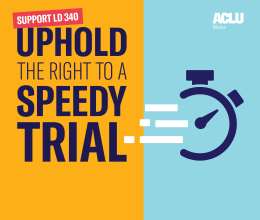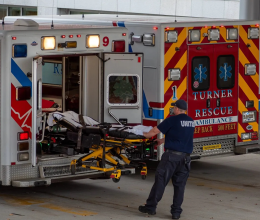AUGUSTA — The Maine Senate has failed to pass an urgently needed bill that would have offered a pathway to recovery for people with substance use disorder and saved the state more than a half million dollars per year by reducing criminal penalties for minor drug possession. Last night's vote was 14 -18.
The Senate’s unwillingness to advance a compromise version of LD 967 comes as Maine reports record drug overdose deaths. The Attorney General’s office has reported 199 suspected or confirmed overdose deaths in the first four months of 2021. That’s an average of 12 overdose deaths per week.
The Senate considered an amendment to LD 967, which would have treated the first two arrests for simple drug possession as a civil penalty and connected individuals to a health assessment by a substance use or mental health counselor. All subsequent drug possession charges would have been Class E misdemeanors, the lowest level offense in Maine.
“The Senate had an opportunity to provide people with desperately needed relief, and it failed,” said Courtney Allen, policy director at the Maine Recovery Advocacy Project (ME-RAP). “We need to change our drug laws if we want to save lives. LD 967 would have saved the state money and reinvested resources from the criminal system into access to recovery services. People need treatment and support to enter sustained recovery, not arrest and a criminal record.”
The original version of LD 967, which passed in the House 77-62, would have eliminated criminal penalties for all minor drug possession. People would have the option to pay a fine or obtain a voluntary health assessment, with the potential of connection to treatment.
The Senate’s vote comes amidst a rising tide of support for policies that remove barriers to treatment and recovery for people with substance use disorder. During its public hearing, LD 967 received overwhelming support from recovery advocates, harm reduction advocates, medical doctors and civil rights organizations. A poll by the ACLU of Maine found 60 percent of Maine voters support treating minor drug possession as a civil violation and offering a connection to treatment, if appropriate.
“I’m deeply disappointed that the majority of the Senate didn’t listen to medical and mental health professionals, people in recovery and our allies,” said Mikki Rice, a recovery advocate. “Despite the outcome, I’m proud of the recovery community’s advocacy on this bill. We have helped remove some of the stigma of criminalizing people for a medical condition. We are not done fighting, and we have built momentum for future policy changes."
The following statements can be attributed as noted:
Meagan Sway, policy director, ACLU of Maine
“Most Mainers agree that punitive drug laws don’t work and people who use drugs need access to treatment and support, not criminal punishment and stigma. We need a public health response to a public health crisis, and we will continue to fight until we get it. It’s what Mainers want and it’s what Mainers deserve.”
Whitney Parrish, director of policy and advocacy, Health Equity Alliance (HEAL)
“LD 967 would have been a transformative step toward supporting Mainers harmed by punitive drug policy, saving lives and rebuilding communities devastated by antiquated approaches to addressing problematic drug use. Mainers recognize it is time for compassionate, commonsense approaches that work, not harm. The outpouring of support for this bill reflects the need for a new approach in Maine amidst a deadly, worsening crisis that hurts us all.”








